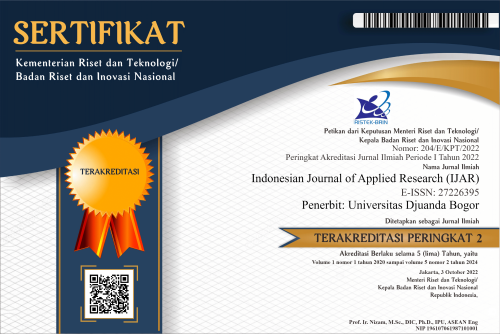Using of Contextual Teaching and Learning Models to Improve Students Natural Science Learning Outcomes
Abstract
This research is a Classroom Action Research which aims to determine how efforts to improve learning outcomes through the model of Contextual Teaching Learning students 5B grade in science subjects at SDN Siliwangi. The grand tour initial showed that only 35.71% or 15 students scored above the KKM with a total of 42 students. The average science score in class 5B is 60.95. This Classroom Action Research uses the Kemmis and McTaggart model which consists of planning, implementing, observing and reflecting with success indicators of 80% of students have achieved learning outcomes with a KKM score of 65 and teacher and student activeness reaching 85%. The results showed that from 3 aspects studied, namely: Student learning outcomes obtained 54.76% learning completeness in the first cycle and 76.42% in the second cycle 84.37% student activity in the first cycle and 87.50% in the second cycle. Teacher activeness was 83.34% in the first cycle and 89.58% in the second cycle The increase in the percentage of the results of the primary cycle aspects of student learning outcomes was 19.05%, 22% student and activeness13% teacher activeness. Meanwhile, in the first cycle and the second cycle, the increase in the aspects of learning outcomes was 28%, student activity 3% and teacher activity 6%.
References
Adri, H. T., Yudianto SA, Mawardini, A., & Sesrita, A. (2020). Using Animated Video Based on Scientific Approach To Improve Students Higher Order Thinking Skill. Indonesian Journal of Social Research (IJSR), 2(1), 9–17. https://doi.org/10.30997/ijsr.v2i1.23
Aliyyah, R. R (2018). Management of Educators and Education Personnel. Polimedia Publishing.
Aliyyah, R. R, Rasmitadila, Rachmadtullah, R., Mulyadi, D., & Ikhwan, S. (2019). Using of Student Teams Achievement Divisions Model (STAD) to Improve Student’s Mathematical Learning Outcomes. Journal of Physics: Conf. Series, 1175.
Aliyyah, R.R., Puteri, F., Kurniawati, A. (2017). The Influence of Independent Learning on Science Learning Outcomes. Jurnal Sosial Humaniora, 8, 126–143.
Aliyyah, R. R, & Abdurakhman. (2016). Management of Lower Grade At Amaliah Elementary School Ciawi Bogor. Jurnal Sosial Humaniora, 7(2), 81–95.
Aliyyah, R. R. (2016). Efforts To Improve Student Mathematics Learning Results Through The Student Team Method Achievement Divisions (STAD) In Class III Students At SDN Cipayung 01 Cibinong Kab Bogor. Jurnal Pendidikan Guru Sekolah Dasar, 421–433.
Anitah. (2017). Learning Strategies in SD. Universitas Terbuka.
Buaraphan, K. (2016). The Development of Qualitative Classroom Action Research Workshop for In-Service Science Teachers. Asia-Pacific Forum on Science Learning and Teaching, 17(1).
Daryanto. (2013). Strategy and Teaching Stages. CV. Yrama Widya.
Khasinah, S. (2013). Classroom Action Research. Jurnal Pionir, Volume 1, Nomor 1, 1(2), 33–61. https://doi.org/10.17977/um013v1i42017p156
Komalasari. (2013). Contextual Learning: Concepts and Applications. Refika Aditama.
Mettetal, G., & University--south, I. (1998). Improving Teaching Through Classroom Action Research. The Professional & Organizational Development Network in Higher Education., October.
Sukajati. (2008). Classroom Action Research in SD. Center for the Development and Empowerment of Teachers and Mathematics Education Personnel.
Sukarni, E. I. (2015). Improving Teachers’ Professionalism Through Materials Development, Information Technology and Classroom Action Research. TEFLIN Journal, 20(2), 212–231. https://doi.org/10.15639/teflinjournal.v20i2/212-231
Tabany, A. (2014). Designing Innovative, Progressive and Contextual Learning Models: Concepts, Foundations and Their Implementation in the 2013 Curriculum. Prenadamedia Group.
Taniredja, T., Pujiati, I., & N. (2012). Classroom Action Research for Teacher Professional Development: Practical, Practical and Easy. Alfabeta.
Taniredja, T., Pujiati, I., & N. (2015). Designing Innovative-Progressive Learning Models: Concept, Foundation and Implementation in the Education Unit Level Curriculum (KTSP). Alfabeta.
Trianto. (2009). Designing Innovative-Progressive Learning Models: Concept, Foundation and Implementation in the Education Unit Level Curriculum (KTSP). Prenada Media Group.
Copyright (c) 2020 Indonesian Journal of Applied Research (IJAR)

This work is licensed under a Creative Commons Attribution-ShareAlike 4.0 International License.
The Authors submitting a manuscript do so on the understanding that if accepted for publication, copyright publishing of the article shall be assigned/transferred to Indonesian Journal of Applied Research (IJAR) Universitas Djuanda as Publisher of the journal. Upon acceptance of an article, authors will be asked to complete a 'Copyright Transfer Agreement'. An e-mail will be sent to the corresponding author confirming receipt of the manuscript together with a 'Copyright Transfer Agreement' form by online version of this agreement.
Indonesian Journal of Applied Research (IJAR) Universitas Djuanda, the Editors and the Editorial Board make every effort to ensure that no wrong or misleading data, opinions or statements be published in the journal. In any way, the contents of the articles and advertisements published in the Indonesian Journal of Applied Research (IJAR) Universitas Djuanda are sole and exclusive responsibility of their respective authors and advertisers.
Remember, even though we ask for a transfer of copyright, our journal authors retain (or are granted back) significant scholarly rights as mention before.
The Copyright Transfer Agreement (CTA) Form can be downloaded here: Copyright Transfer Agreement-IJAR 2020
The copyright form should be signed electronically and send to the Editorial Office e-mail below:
Prof. Dr. Ir. Dede Kardaya, M.Si. (Editor-in-Chief)
Universitas Djuanda
Jl. Tol Jagorawi No.1, Ciawi, Kec. Ciawi, Bogor, Jawa Barat 16720
Website: http://journal.unida.ac.id/index.php/IJAR/index
Email: ijar@unida.ac.id






 This work is licensed under a
This work is licensed under a 